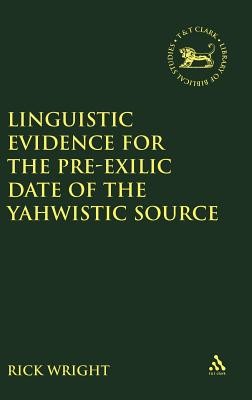
- We will send in 10–14 business days.
- Author: Richard M Wright
- Publisher: CONTINNUUM 3PL
- ISBN-10: 0567041212
- ISBN-13: 9780567041210
- Format: 15.6 x 24.4 x 2.2 cm, hardcover
- Language: English
- SAVE -10% with code: EXTRA
Linquistic Evidence for the Pre-Exilic Date of the Yahwistic Source (e-book) (used book) | bookbook.eu
Reviews
Description
For the past few decades a growing number of scholars have attempted to overthrow the traditional Wellhausian view that the so-called 'Yahwist' or 'J' source of the Pentateuch is the oldest of the four major sources. These scholars have argued that J was composed during the exilic or post-exilic periods of ancient Israel. Their arguments have focused on the literary, historiographic, and theological characteristics of 'J'. This book attempts to re-evaluate on linguistic grounds such efforts to place the Yahwist source in the exilic or post-exilic periods. The study employs the methodology developed most prominently by Avi Hurvitz for identifying characteristic features of post-exilic Hebrew ('Late Biblical Hebrew'). This divides the language of the Hebrew Bible into three main chronological stages: Archaic Biblical Hebrew (ABH), Standard Biblical Hebrew (SBH), and Late Biblical Hebrew (LBH). Wright examines 40 features of J for which useful comparisons can be made to LBH and finds no evidence of LBH in the entire Yahwist source. Therefore it is unlikely that J was composed during the post-exilic period. Moreover since Hurvitz has shown that the exilic period was a time of transition between SBH and LBH such that late features began to occur in exilic texts, the author concludes on linguistic grounds that J was most likely composed during the pre-exilic period of ancient Israel.
EXTRA 10 % discount with code: EXTRA
The promotion ends in 19d.14:35:38
The discount code is valid when purchasing from 10 €. Discounts do not stack.
- Author: Richard M Wright
- Publisher: CONTINNUUM 3PL
- ISBN-10: 0567041212
- ISBN-13: 9780567041210
- Format: 15.6 x 24.4 x 2.2 cm, hardcover
- Language: English English
For the past few decades a growing number of scholars have attempted to overthrow the traditional Wellhausian view that the so-called 'Yahwist' or 'J' source of the Pentateuch is the oldest of the four major sources. These scholars have argued that J was composed during the exilic or post-exilic periods of ancient Israel. Their arguments have focused on the literary, historiographic, and theological characteristics of 'J'. This book attempts to re-evaluate on linguistic grounds such efforts to place the Yahwist source in the exilic or post-exilic periods. The study employs the methodology developed most prominently by Avi Hurvitz for identifying characteristic features of post-exilic Hebrew ('Late Biblical Hebrew'). This divides the language of the Hebrew Bible into three main chronological stages: Archaic Biblical Hebrew (ABH), Standard Biblical Hebrew (SBH), and Late Biblical Hebrew (LBH). Wright examines 40 features of J for which useful comparisons can be made to LBH and finds no evidence of LBH in the entire Yahwist source. Therefore it is unlikely that J was composed during the post-exilic period. Moreover since Hurvitz has shown that the exilic period was a time of transition between SBH and LBH such that late features began to occur in exilic texts, the author concludes on linguistic grounds that J was most likely composed during the pre-exilic period of ancient Israel.


Reviews